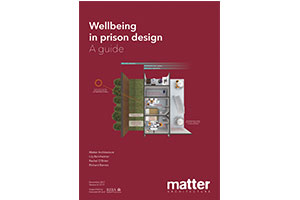
PPSS Group Launch Next Generation Body Armour Offering Previously Unthinkable Levels Of Protection
PPSS Group's next generation of high-performance body armour is taking personal protection to a completely new-found level.
Made from Auxilam™, a unique carbon fibre composite material, this latest body armour will protect the wearer from even the most vicious and brutal types of edged weapon and shanks imaginable.

After more than four years delivering its insight-based programme to men in prison, Beyond Recovery started working with HMP Nottingham in March 2019. The team was asked to assist in the development of the prison's Incentivised Substance Free Living (ISFL) wing, by providing support to the men living there. David Kowitz, philanthropist, generously provided funding for Beyond Recovery to deliver their programme in Nottingham prison.

Nearly half of police officers (42%) have called for investment in new technology to help fight modern day crime, according to a new report.
Research by YouGov, launched by SSCL, found that when asked which technology- based tools should be prioritised as an investment to help target modern day crime, officers called for increased investment to fight cyber/ online crime (56%) as the greatest need, while investments in mobile/ self-service devices (51%) and big data processing (35%) were also essential.

Recent studies from the National Association of Counties indicated that approximately 64 percent of jail inmates have mental health issues. Unfortunately, the design of existing jail facilities do not adequately house, let alone treat, those with mental illness. As a result, more counties
and states are beginning to re-assess, redefine and rebuild detention facilities using a new design model that emphasizes next-generation jails.
Re-Defining Design Priorities
Jail facilities of the past were designed to incarcerate, and the medical and mental health programs had to fit within this environment. The latest trend reverses that perspective so that we first design the facilities specifically for medical and mental health patients, and the incarceration requirement becomes just a unique element of that model instead of the other way around.

Getting drugs out of our prisons is a critically important issue, and it deserves a better treatment.
There’s no dispute that the drugs trade in prison fuels violence and self harm, nor that its impact spills over to families outside. Nor is there any dispute that the emergence of new types of drug have coincided with a crisis in prison resourcing to make those problems very much worse. No prison will achieve what it should if the alternative power structures, which drive the drugs trade hold sway.
So investing in measures to reduce the supply of drugs to prisoners has to be part of the solution.

With eight former Staffordshire Police premises going on sale, property developers and occupiers are presented with the unique opportunity to acquire one or more of the properties.
Strategic property consultancy Jon Flowith & Partners has been instructed to market the eight buildings, which can be bought individually or as a group portfolio. They are located centrally within both town centre and affluent village locations, comprising attractive buildings and exciting development opportunities in:

Jacqueline Hollows, the founder of Beyond Recovery CIC, discusses with The Custodial Review why she set up a social enterprise dedicated to helping prisoners realise their true potential…
Mental health and addiction Q&A
When was Beyond Recovery set up, and what was the driving force behind it?
Beyond Recovery was created as a social enterprise in February 2015 after I had a defining moment of realisation where I saw that the way addiction and mental health are treated and viewed need to be radically changed.

Commenting on the publication of the final report from The Farmer Review for Women today (18 June 2019), Jenny Earle, Prison Reform Trust’s Transforming Lives Programme Director said:
“Lord Farmer’s report makes many practical, and measurable, proposals that if implemented will reduce the number of children unnecessarily separated from their mother by her imprisonment. The review’s focus on increasing the role of community based women’s services, recognises that many women in prison are there for non-violent crimes.

As the PM steps down, Federation National Chair John Apter pulls no punches on the damage she has caused to policing
Theresa May stands down as leader of the Conservative party – she will continue as Prime Minister until her successor is appointed – but in reality, early June marks ‘The End of May’.
Let’s be honest here - for the majority of police officers (myself included) it has not come a day too soon.
Mrs May has made no secret of her thoughts on policing – her contempt and disdain for the profession has been vocal and sustained during her time as Home Secretary, and then throughout her tenure as Prime Minister. Her actions have been devastating for policing, genuinely devastating.

